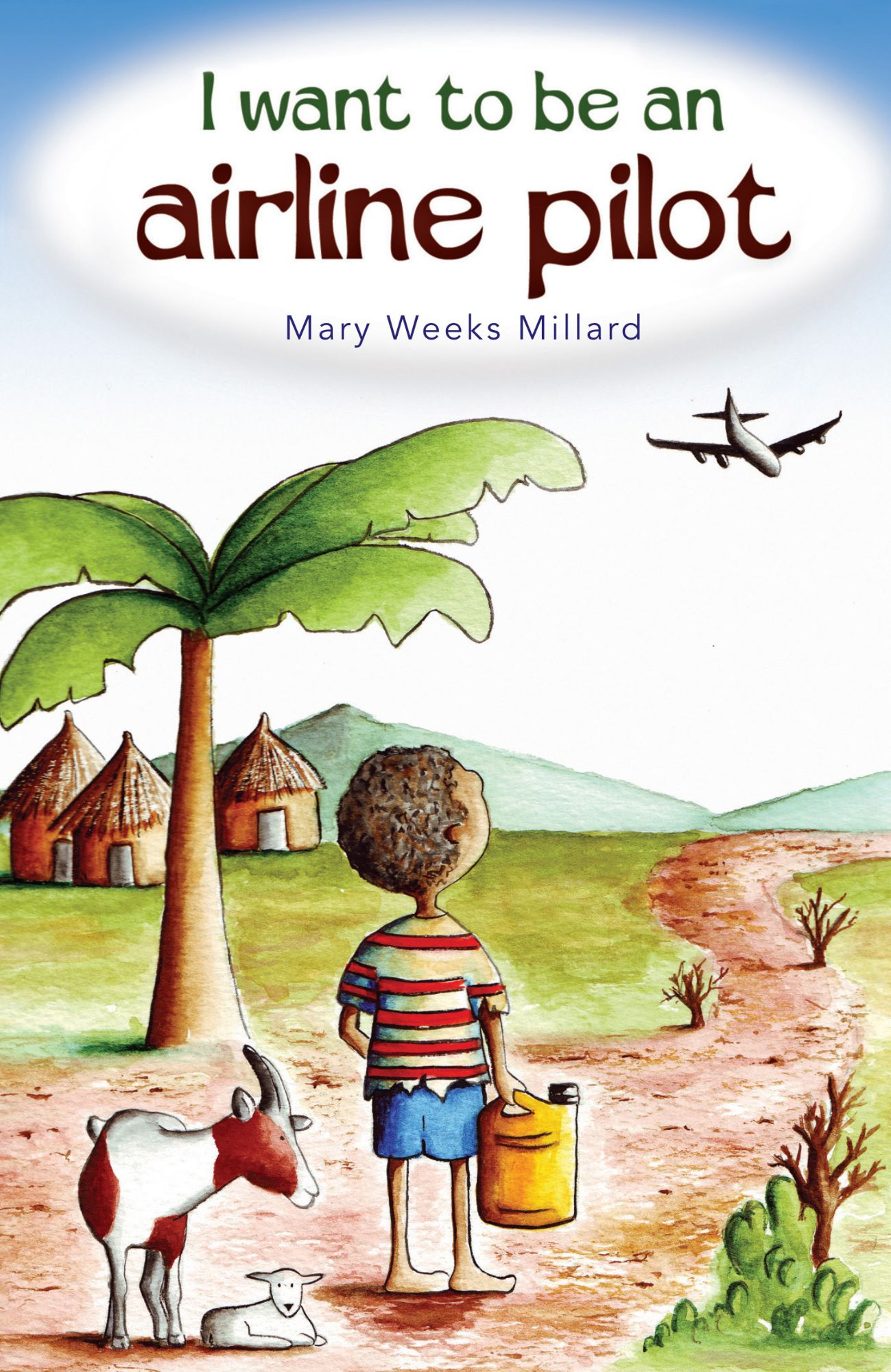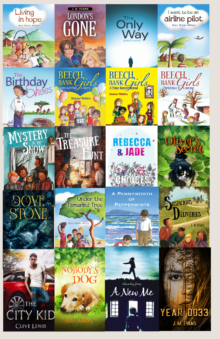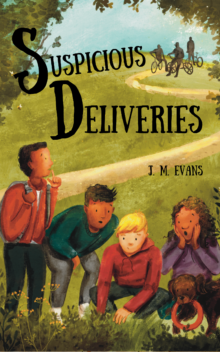Description
This exciting story is the perfect gift for all children everywhere.
Chapter One
The Goatherd
Shema woke up and shivered. He clutched his well-worn blanket and wrapped it tighter around his thin little body. It couldn’t be morning already, he thought, but looking through the little hole in the wall of his bedroom that made a window, he could see that the dawn was making the sky brighter, so he knew it must be so.
Shema lived in a small house that had a tin roof, but both the house and the roof had many holes in them. When it rained, they often got puddles on the floor. Like many traditional houses in Africa, the walls were built of bricks made from mud which had been dried in the sun, but now these were crumbling and there was no glass in the small squares cut into the walls for windows. Some houses in the village had wooden shutters, which could be put in place at night time, but Shema’s house didn’t have any, so it always seemed cold at night. In fact, it was a bit scary because, if you heard a noise, you thought perhaps somebody was climbing in!
“Shema,” called his big sister, Ishimwe, “we need some water, please get up and go to the well.”
“Coming!” Shema answered, but instead of getting up he snuggled down into his blanket for a few more minutes. He didn’t want to get up!
“Shema!” his sister called again, this time in a louder voice. “Please, get the water for us!”
This time Shema sat up and folded his blanket, leaving it on his mattress. He didn’t have a bed, or even a sheet, but shared a mattress made of foam with his small brother Maji. Maji was still fast asleep, but he was only five years old. Shema looked at him and smiled. He was such a funny little boy, always making his brother and sister laugh. Shema felt very grown up because now he was eight!
He rubbed his eyes and stretched. As he only had a few clothes and no night clothes, he just straightened his shorts and top. He had no shoes and his feet were always very dirty from walking on the mud floors in the house and on the dirt roads outside.
It was damp and chilly outside, so Shema found his sweater to put on over his rather old and dirty T-shirt. At least the rainy season was just about finished! He grabbed the yellow plastic jerry can that he used to carry the water and began the walk down the valley to the well. It was a three kilometre walk, but he was used to that. Going down was easy; coming back up with a full can of water on your head was a different matter!
As he ran down the hill, Shema began to feel warmer. He could hear the birds singing in the blue-green eucalyptus trees and the sun was driving away the mist. There were lots of other people on the path, many of them also carrying the yellow cans to collect the water they needed for the day. Some were his friends.
“Hi Shema, how are you today?” called out his friend Sam.
“I’m fine,” he called back. “How was your night?” (This is the usual morning greeting in Rwanda.)
“It was good,” replied Sam. “But now I have to get the water before school.”
“I wish I could go to school,” sighed Shema. “I would love to learn to read and write! If I went to school perhaps I could one day be an airline pilot. Wouldn’t it be wonderful to fly a plane and see other countries?”
“Wow, yes!” agreed Sam. Sometimes the boys saw planes in the sky and loved to watch them and wonder where they were going and who might be on them.
Shema had never been to school. Not only had his parents been killed in a terrible civil war, but all his relations apart from his sister and brother had also died, so now the three children lived together and looked after themselves. It was a hard life for them and they were very, very poor. Ishimwe was only twelve years old herself, but she tried hard to be a mother to the boys, growing and cooking food for them. Outside their house was a small plot of land where she grew millet, cassava, tomatoes and beans.
Ishimwe herself had gone to school for two years. Then the war came and most of the schools closed down. Children stayed at home with their parents, often hiding from the soldiers. So now, with no relatives to help them, she had to keep house, and as she was not able to read or write very well herself, she could not help her brothers to learn. She had no money to be able to send the boys to school, either, for although the classes in primary school were free, the students had to wear uniform and provide their own pencils and exercise books and that was too expensive.
Sam was also poor, but not as poor as Shema. He lived with his mum and grandparents, but his dad had also been killed in the war. He too had an older sister, called Grace, who was now at boarding school in the capital city of Kigali. Most of the senior schools were located in towns and the children went as boarders. So Sam only saw Grace in the long holiday, once a year. He missed having her around, for she used to help him with fetching the water and also explained his homework.
Sam, too, was eight years old and he and Shema had become best friends. They liked to play football together. They had made a ball by wrapping twine made from banana bark around lots of bits of old plastic bags. It had taken a long time to make and was their favourite toy.
“Where are you taking the goats today?” Sam asked his friend.
“I am going to the bushes around your school,” Shema answered. “There are some good bushes there and while the goats are chewing I can sometimes hear the lessons you are learning, so I try to learn them, too.”
Shema looked after some goats for a neighbour in their village and by doing this he earned a little money to help buy food. He liked the goats, giving them all names and talking to them through the day. The goats, too, were his friends.
“If you keep the goats there until after school, I’ll meet you and we’ll play football,” suggested Sam.
By now they had reached the well and filled their cans with water. It was much harder returning home balancing the can on your head! Even though they did this journey every day, the boys always found lots to talk about as they walked along the track. Somehow, the water can did not seem so heavy when you had a friend to talk to as you walked!
When they reached the house where Sam lived, they saw his mother in the doorway waiting for them. Sam’s house was a good one; the mud bricks had been coated with cement, which made it more waterproof. There were several rooms inside, but it was still not very big and was all on one floor, as were most of the village houses. Sam’s mother always had a smile for Shema and a kind word to cheer him up. Today she called him over. “Can you spare a moment, Shema?”
“Yes Mama Grace,” he answered. (A mother in Rwanda is always called after the name of her first child, that is why Shema called her Mama Grace.) “But I must not be long as Ishimwe is waiting for the water and I must collect the goats.”
“I won’t keep you long,” Mama Grace assured him.
Shema went inside the house. The floor of this house had been cemented over and it felt cold to his bare feet. The sitting room had a sofa and two big chairs and Shema stroked them gently as he stood there. He didn’t like to sit down in his dirty shorts in case he spoilt the cushion. The material felt so soft and special, so different from the hard bench in his house!
“Do you think that this will fit you and this fit Ishimwe?” asked Mama Grace as she held up two beautiful sweaters. They were lovely, not like the one he was wearing which had many holes in it. Shema just looked in amazement!
“These are for us?” he asked.
“Yes, if you would like them. I have been given them for my children, but they do not need them, so I thought you would like them.” Shema’s eyes were shining! He reached out and touched the sweaters. They were soft and warm.
“They are so wonderful, so wonderful, thank you, thank you so much!” he said. “I don’t understand why you are so kind to me, I am not your child.”
“Shema,” Mama Grace said quietly, “You may not be my child but I love you and God loves you very much. When I talked to God he told me to give these to you.”
Shema didn’t really understand that. How could someone called God love him, just a poor uneducated goatherd, who was an orphan? He didn’t know anything about God, but he did know that Sam’s family went to the church in the village and talked a lot to this God and sang to him. They talked about “praying”. It was all very strange to Shema and Ishimwe couldn’t answer his questions about who God was either, because she didn’t know. Perhaps he would learn about it at school one day, if he were ever able to go there. Anyway, he figured this God must be someone special if he told Mama Grace to give them these lovely sweaters!
Shema put his jerry can of water back on his head and the precious bundle with the sweaters under his arm and almost ran with excitement back to the little house where he lived.
“Ishy, Ishy, come quickly, come quickly!” he yelled at the top of his voice, as he came near the door.
Ishimwe thought something terrible must have happened, so she came running to meet him, with Maji following just behind.
“Look, look! Sam’s mother has given us a new sweater each,” he explained as he put down the package and took the water container off his head. Shema then held up the lovely sweaters to show her. Suddenly he saw Maji’s face and realised that there wasn’t one for him. His happiness disappeared. What could he do? “I wonder,” he thought to himself, “if I could I ask that God person for a sweater for a five year old? If he loves me like Mama Grace said he does, he would understand that Maji needs one, too.”







Dennis Burns –
Reading this book in retirement I found it to be a gripping and enjoyable story, which also manages to describe in a simple, but very real way, the experience of a child or adult calling out to God in our distress and Him hearing our voice and coming to us.
I look forward to reading this book to grandchildren when they are old enough.